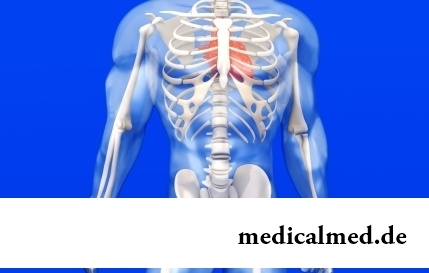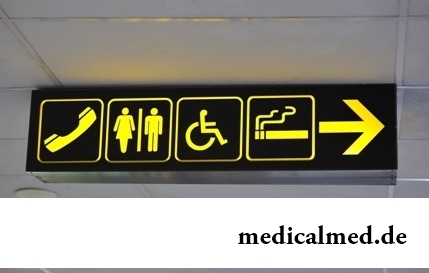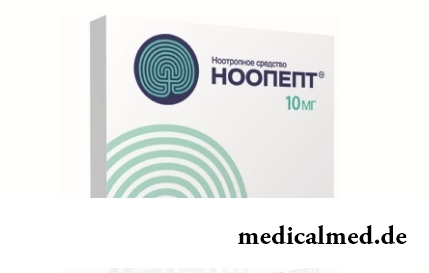





Neurologist
The neurologist – the doctor who is engaged in identification and treatment of diseases of various parts of the nervous system. The following parts of the nervous system are under authority of the neurologist:
- Brain;
- Spinal cord;
- Peripheral nerves;
- Autonomic nerves.

Before the doctor of this specialty called also the neuropathologist, but this term became outdated and is not used any more. The patient can receive recommendations about inspection and treatment on reception at the neurologist in policlinic (on an outpatient basis). In a case, demanding special inspections and procedures, it is possible to receive medical treatment in a specialized neurologic hospital. Consultation of the neurologist is necessary also in emergency situations, for example, in case of a stroke, an attack of neuralgia or spasms. The neurologist helps to distinguish diseases of a nervous system from the somatic, having "mask" nervous diseases.
Today the neurologist quite often has adjacent or narrower specialty, for example, on psychiatry, an epileptologiya or an osteopathy.
Inspection at the neurologist
On reception the neurologist at first asks the patient on complaints. Most often dizzinesses, faints and headaches, dorsodynias, a lack of coordination or sensitivity, a dysmnesia, sight or hearing, the increased sweating, nervousness and irritability, sleeplessness become a reason for consultation of the neurologist.
In developing of diseases of a nervous system the way of life of the person, a condition of its work, hereditary burdeness on some diseases, the traumatized, accompanying diseases, etc. can play an important role. The neurologist learns about all this at inquiry of the patient.
At the general survey on reception can be found in the neurologist the increased or lowered pressure which can play a role in developing of a stroke, and also to be one of symptoms of neurocirculatory dystonia.
Special neurologic inspection gives to the neurologist an idea of work of a nervous system. Such inspection has to be complex and estimate work of all parts of the nervous system – from a brain to muscles which are innervated by receptors. Besides, during consultation the neurologist will never disregard also estimates higher nervous activity.
For carrying out neurologic inspection the neurologist adheres to his accurate scheme, carrying out one after another assessment:
- Mentalities;
- Cranial nerves;
- Movements;
- Refleksov;
- Sensitivity;
- Coordination;
- Gait.
During inspection the neurologist at first will reveal the place of defeat (the topical diagnosis), and further on separate symptoms will establish the clinical diagnosis.
Patients with signs of defeat of a nervous system are exposed to full neurologic inspection. If the person does not show complaints, then usually is rather short neurologic inspection which according to neurologists takes no more than 3 - 5 minutes. It includes consciousness assessment, a research of mobility of mimic muscles and eyes (including an eyeground, pupils), speeches, forces of muscles in hands and legs, bottom and tendon jerks, gait and painful sensitivity.
Sometimes even at a serious neurologic illness it is not possible to reveal disturbances in work of a nervous system, for example, out of an attack at epilepsy. In this case the anamnesis of a disease is important for work of the neurologist.
It is possible to carry to additional methods of neurologic inspection radiological, an electroencephalography (EEG), an ekhoentsefalografiya (ЭхоЭГ), a rheoencephalography (REG), ultrasonic doppler sonography (UZDG), an electromyography (EMG). According to neurologists modern methods of visualization (KT, MRT, UZDG) allow to carry out more precisely and quickly topical diagnosis.
Only after full and profound inspection the neurologist exposes the diagnosis and appoints treatment. According to neurologists a difficult and important part of their work is made by communication with relatives of the patient who need to know about the forecast of a disease and ways of rehabilitation of neurologic patients.
Pathology of a nervous system
Nervous diseases – quite widespread pathology. Most often the neurologist should face such diseases as:
- Stroke;
- Vestibular disturbances;
- Neurocirculatory dystonia;
- Epilepsy;
- Degenerative processes in a nervous system (Alzheimer's disease, etc.);
- Inflammatory processes in a nervous system (neuritis, meningitis, encephalitis);
- Backbone diseases (osteochondrosis, hernias);
- Injuries of a nervous system.
Besides, some diseases of a nervous system have accurate relationship of cause and effect with body somatopathies.
Children's neurologist
Survey of the children's neurologist is included into the program of inspection of all children till 1 year. It is important to make it in so early terms not to miss pathological changes in a nervous system of the child and not to lead to a delay of his development. Besides, the nervous system of the child has good recovery potential, and timely treatment according to neurologists can lead to an absolute recovery. If in time not to take a measure, then further it can reflect adversely on study, ability to concentrate attention and assiduity.
Only the children's neurologist because even many pediatricians hardly draw a distinction between norm and pathology in nervous activity of babies has to be engaged in a nervous system of children. Survey of the children's neurologist sometimes reveals failures in work of a nervous system even in the absence of complaints at the child's parents.
Specifics of work of the children's neurologist are that a part of neurologic diseases arises right after the birth and therefore there are difficulties assembled of the anamnesis and complaints when the kid does not speak yet. For treatment the neurologist appoints drugs, safe for use in pediatric practice and expects them the weight and age of the child.
Good comments on the neurologists working with children – a sign that the doctor found a common language with the kid and his parents.
If your liver ceased to work, death would come within a day.

The phenomenon of the panic attack is known long ago, but the reasons of its emergence still are up to the end not found out. It is established that more than 30%...
Section: Articles about health
The drugs stopping or oppressing life activity of pathogenic microorganisms are widely applied in clinical practice from 40th years of the last century. Originally antibiotics were called only substances natural (animal, vegetable or микробног...
Section: Articles about health
For the city dweller the fitness is the most convenient sport. It is enough to acquire the subscription to the gym to get access to various apparatuses and an opportunity to train under the leadership of the experienced consultant. Many consider fitness the best way of maintenance of physical shape and receiving dynamic loads which the people occupied preferential with brainwork so need. Nevertheless, representations of most of consumers of similar services about специф...
Section: Articles about health
History of use of an anesthesia during operations contains more than 160 years. Annually in the world hundreds of thousands surgical вм are carried out...
Section: Articles about health
Proofs of efficiency of Mildronate at treatment of coronary heart disease with stenocardia can be found in many publications of the end of the twentieth century. Researches were conducted since 1984, including placebo - controlled effects. In total клиничес...
Section: Articles about health
Ability of an organism to resist to adverse environmental factors (to impact of temperature drops, humidity and pressure, to the attacks of causative organisms, etc.) directly depends on what the person eats. Business here not only in that cells of a body received a necessary set of nutrients, vitamins and microelements. Scientists established that such components which are capable to influence negatively immune system, in connection with also are a part of foodstuff...
Section: Articles about health
Sugar - the digestible refined product which is not of special value for an organism of the modern person. Use...
Section: Articles about health
Urogenital candidiasis (milkwoman) – a fungal infection which annoys unpleasant feelings in the field of generative organs, being followed by white curdled allocations, an itch, discomfort during an urination, pain. She is called by Candida fungus – a mustache...
Section: Articles about health
Bees – really unique beings. Practically all products of their life activity are used by the person. Since the most ancient times medicinal properties of honey and other substances received in the course of beekeeping are known. The fact that all these products are recognized not only national, but also official medicine is especially significant. About influence and routes of administration of bee "drugs" the speech in this article will also go....
Section: Articles about health
Tick-borne encephalitis – one of the most dangerous viral diseases which causative agents transfer and is given to people by ixodic mites. Эт...
Section: Articles about health
For many women the word "fat" sounds as a sentence. In aspiration to an ideal figure they try to exclude, first of all, from the menu all dishes containing fats without having at the same time a clear idea of a role of these substances in exchange processes, and about an afterbirth...
Section: Articles about health
Season of activity of viral infections in the heat. Everyone can get sick, but probability of this unpleasant event it is possible and it is necessary to minimize. There is a number of rules, following to which will help or to avoid absolutely infection with flu or a SARS, or to have an illness benign and without essential complications. About ways of prevention of seasonal infections the speech in this article will also go....
Section: Articles about health
For the help to doctors in the choice of optimal solutions for treatment of various diseases the Cochrane scientific organization (Cochrane) will see off совм...
Section: Articles about health
Water with a lemon - idle time in preparation drink which supporters of a healthy lifestyle already managed to appreciate. Used in a warm look and on an empty stomach, it is one of the most useful prophylactics allowing to prevent tens з...
Section: Articles about health
Helminthosis is one of the most widespread diseases. Statistically, any species of helminths infected every third inhabitant of the planet. Most of specialists even consider these data strongly underestimated: some uninvited "cohabitants" do not cause the carriers serious troubles, and patients just do not see doctors. The situation is aggravated also with the fact that people know about specifics of similar illnesses very little. At many presence of worms is strong ассоциир...
Section: Articles about health
Aspirin (acetylsalicylic acid) – one of those drugs which are known literally to all. It is available in each home first-aid kit...
Section: Articles about health
Smack in a mouth can arise in the natural way – as a result of lack of morning hygiene or reception of the corresponding food. However in certain cases its existence is a sign of certain pathologies, and allows to reveal an illness at an early stage. In we depend...
Section: Articles about health
The summer of this year in Russia was very ambiguous. Regions suffered from a merciless heat, from pouring rains, the hail from time to time dropped out, then there was again a heat which alternated with rainfall again. Many people suffer from such sharp changes of weather. Even flu epidemics and a SARS were recorded....
Section: Articles about health
The saying "the rich do not know how the other half lives" is known to all. In a broad sense it is that we can not always understand the person, about...
Section: Articles about health
It would seem, about it there can be no disagreements: water is necessary for a human body for normal life activity, and about how and when it should be drunk, all know. It turned out that the situation is not absolutely so: for many years occur ве...
Section: Articles about health
Venereal diseases in medicine are called the infections which are transmitted preferential sexually, now they and are called - infections, sexually transmitted, or STD. Among them is also life-threatening. In spite of the fact that the majority of diseases such will respond to treatment, they are widespread everywhere, and there is no tendency to decrease in incidence. Besides, some of them promptly look younger: statistically, a third of young people at the age of 16-22 years of a str...
Section: Articles about health
From the failure of work of immune system which is shown in the form of an allergy, statistically, more than 40% of the population of the globe suffer. In большинс...
Section: Articles about health
Many of us, probably, noticed more than once that from intellectual loadings at some point the brain as though "overheats" and "assimilation" of information is strongly slowed down. Especially this problem urgent for persons of age becomes more senior than fifty years. "It is already bad with...
Section: Articles about health
Heart disease and blood vessels lead to disturbance of blood supply of bodies and fabrics that involves failures in their work, deterioration in health of the person, decrease in its working capacity and standard of living. Annually more than 17 million inhabitants of our planet perish from pathologies such....
Section: Articles about health
Musicotherapy – a treatment method which caused and causes a set of a controversy concerning its efficiency. However the facts are relentless:...
Section: Articles about health
The immunity role in growth of the child is invaluable. The proteins-immunoglobulins produced by immune system preserve the child against the diseases capable − owing to an organism weak still − to serve as a stressful factor, to become the reason of many complications and delays in unless...
Section: Articles about health
The naturopathy sometimes moves as the new direction of medicine, something like fashionable hobby, and there is nothing farther from the truth. This most ancient direction, the word "naturopathy" is translated as "treatment by the nature", and, no doubt, treatment by natural gifts was the first and only, available to the person in ancient times. Despite modern achievements of medicine, the naturopathy remains urgent and today, anyway the person - a part of the nature, and природн...
Section: Articles about health
